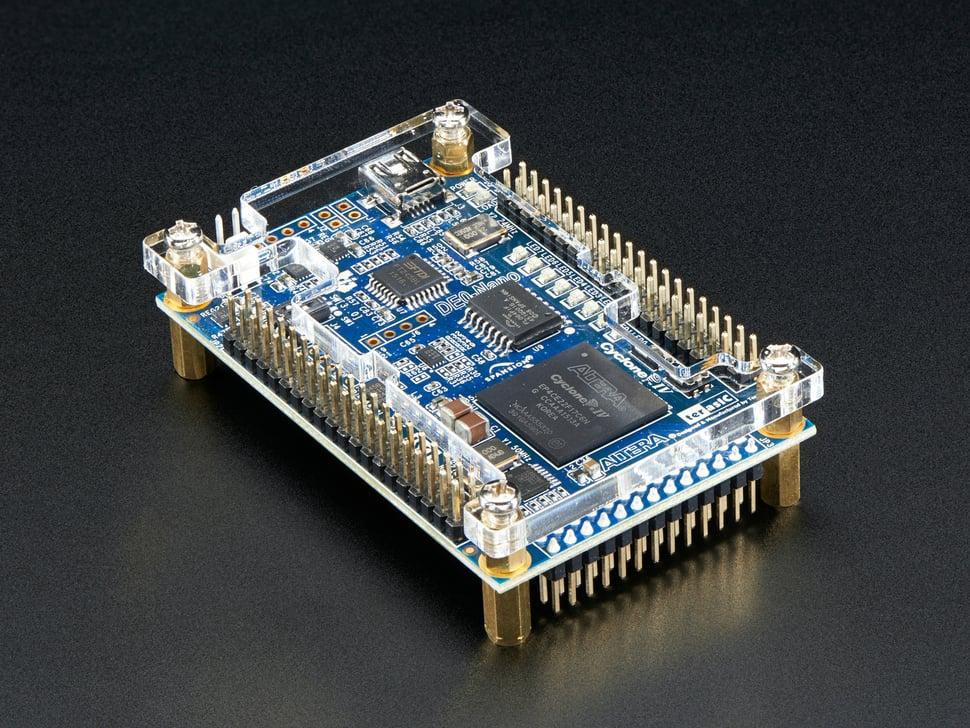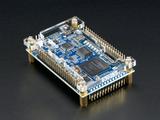Adafruit DE0-Nano - Altera Cyclone IV FPGA starter board

Description
For everyday projects, microcontrollers offer a low-cost and easy-to-use solution. For tasks demanding raw power and high speed, Field Programmable Gate Arrays (FPGAs) serve as the sophisticated alternative. FPGAs are akin to raw chips that you can design manually, excelling in speed and efficiency. They're especially adept at mass-parallel execution, making them ideal for managing numerous I/O pins in real-time video, audio, or emulation applications.
FPGAs also provide an enjoyable design experience, letting users delve into chip architecture. For those new to this technology, the Altera starter pack represents an excellent entry point. It's a compact, feature-rich board offered at an attractive price. Included in the package is a DE0 Nano development board and a USB cable, enabling programming and power supply directly via USB.
Although a physical manual is absent, the comprehensive Altera FPGA training curriculum available online can guide users through a self-directed educational journey. The required software for compiling and uploading code to the board is available for download on the website, compatible with Windows and Linux systems.
The module itself hosts a suite of accessories, including the Altera Cyclone IV FPGA with:
- 22,320 Logic Elements (LEs)
- 594 Kbits Embedded memory
- 66 Embedded 18 x 18 multipliers
- 4 General-purpose PLLs
- 153 Maximum FPGA I/O pins
- 50 MHz clock oscillator
- 8-channel 12-bit Analog/Digital converter (NS ADC128S022)
- 32 MB SDRAM
Additional features include an on-board USB blaster programming interface, USB mini-AB port, 2Kb I2C EEPROM, 4 DIP switches, 8 green LEDs, and an ADXL345 3-axis accelerometer. The board features two 40-pin IDC-compatible headers providing 72 general purpose I/O pins, as well as one 26-pin header offering 16 digital I/O and 8 analog input pins for external sensor connectivity. A 40-pin female/female socket cable is recommended for connecting external sensors once onboard accessories reach their limit.
Properties
| Brand | Adafruit |
| Model | 451 |
ETA is not known
Customer questions
Customer Reviews
- In stock Adafruit White LED Backlight Module - Medium 23mm x 75mm € 3,25 View product
- In stock Adafruit Waterproof DC Power Cable Set - 5.5/2.1mm € 3,25 View product
- In stock Adafruit Breadboard-friendly SPDT Slide Switch € 1,25 View product
- In stock Adafruit Small Enclosed Piezo w/Wires € 1,25 View product
- In stock Adafruit Mini Metal Speaker w/ Wires - 8 ohm 0.5W € 2,50 View product
- In stock Adafruit JST PH 2-Pin Cable – Male Header 200mm € 1,- View product
- In stock Adafruit Small Alligator Clip to Male Jumper Wire Bundle - 6 Pieces € 6,40 View product
- In stock Adafruit NOOds - Flexible LED Filament - 3V 300mm long - Lime Green € 8,75 View product
- In stock Adafruit NOOds - Flexible LED Filament - 3V 300mm long - Warm White € 5,75 View product
- In stock Adafruit Woven Conductive Fabric - 20cm square € 6,25 View product
- In stock Adafruit Single ended nOOds - 128mm long Flexible LED Filament - Blue 3V € 5,- View product
- In stock Adafruit Micro Lipo - USB LiIon/LiPoly charger € 7,50 View product
- 5 pieces In stock Adafruit NeoPixel Diffused 5mm Through-Hole LED - 5 Pack € 6,25 View product
- In stock Adafruit Stereo Enclosed Speaker Set - 3W 4 Ohm € 9,25 View product
- In stock Adafruit bq25185 USB / DC / Solar Charger with 3.3V Buck Board € 11,25 View product
Recently viewed items
- Adafruit DE0-Nano - Altera Cyclone IV FPGA starter board € 185,- View product
- Sparkfun Screw Terminals 3.5mm Pitch (3-Pin) € 1,75 View product
- Sparkfun Jumper Wire - 0.1", 3-pin, 4" € 2,- View product
- Adafruit 1 Watt Cool White LED - Heatsink Mounted € 5,- View product
- Adafruit Triple SpokePOV Kit + Dongle + 2 Magnets € 139,- View product
- Adafruit Proto Shield for Arduino Kit € 18,50 View product
- Adafruit DotStar Digital LED Strip - Black 144 LED/m - 0.5 Meter € 30,75 View product
- Adafruit Slim Metal Potentiometer Knob - 10mm Diameter x 10mm - T18 € 1,25 View product
- Adafruit CharliePlex LED Matrix Bonnet - 8x16 Blue LEDs € 16,- View product
- Adafruit LPS22 Pressure Sensor - STEMMA QT / Qwiic € 8,75 View product
- Adafruit Mini Stepper Motor - 200 Steps - 20x30mm NEMA-8 Size € 24,50 View product
- Adafruit 3 x 1U and 2 x 1.25U "Ctrl" Silicone Keycap Molds € 5,- View product
- Adafruit Side-light Fiber Optic Tube - 5mm Diameter - 1 meter long € 9,25 View product
- Adafruit Side-light Fiber Optic Tube - 4mm Diameter - 1 meter long € 9,25 View product
- Adafruit EYESPI Cable - 18 Pin 100mm long Flex PCB (FPC) A-B type € 1,25 View product










